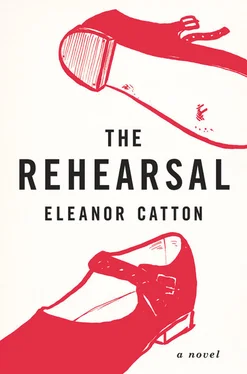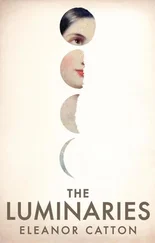“That is what intimacy means,” the Head of Acting said. “Intimacy is all the moments that you would be unwilling to share.”
The Head of Acting looked at the boy Oliver and tapped his fountain pen against his desktop in a disapproving way.
“You can get down,” he said at last. “But I haven’t finished with you.”
The Head of Acting was sitting behind the students, arranged sideways behind a small writing-desk, with his long legs folded and one palm absentmindedly stroking his calf as he wrote. He watched the shamed Oliver return to his seat next to his girlfriend on the floor, and then capped his pen crisply.
“Stanley,” he said. “Up you get.”
Friday
Julia’s cue cards are swollen at the edges from the damp of her hands.
“The girls are like wax models in a living tableau: it’s always the same scene and they’re always in the same configuration,” she is saying. “Whoever is the most sexed-up functions as the snare. The snare is always in the middle. She can’t be too near the edge or she’d be an easy target.”
A crisp spotlight nails Julia flatly to the wall.
“The snare is not necessarily the most beautiful,” she says, “but she is always the most provocative. Sometimes the snare will do things that will shame or embarrass the other figures, mostly by adopting a crass or deliberately scandalous manner. That’s a normal part of her role.
“The most beautiful girl sits to one side of the snare, and she is known as the prize. The prize is characterized by her untouchability. She is often the only figure in the tableau to be in a stable long-term relationship. The objective of this relationship is always to emphasize her untouchability. Typically the prize is clean and successful and unknowable.
“Standing behind the snare and the prize is the manager. The manager orchestrates all movements within the tableau. The manager is often hard to spot: methods of management naturally differ from group to group. Some common methods of covert management include the use of wit or cruelty, or sometimes the adoption of a motherly persona.
“All other figures in the tableau are the aspiring servants of this central trio. They are used as foils, scapegoats or canned laughter.”
Julia has a peculiar flat way of delivering her lines sometimes, as if somebody has forced her to read them and she wants to make clear her private feelings of contempt.
“The depressing fixity of this tableau,” she says in conclusion, “makes it clear to us why girls value reincarnation and reinvention above all things.”
Monday
There are no counseling sessions about Bridget’s death. A flag is retrieved from the sports cupboard, ironed, and hauled to half-mast where it spends a glum week slapping against the rusted flagpole. The girls move around the campus in a vast ghostly drift. They are ashamed that they feel nothing and so respectfully they affect to feel very much. They self-consciously contemplate their own mortality as they watch the raindrops travel down the glass. They sigh and take too long in the toilet cubicle, and say to each other, “I think I need to be alone for a while.”
“It’s the little things,” Julia hears a girl say to her friend while they wait in the line for the tuck shop. “It’s the little things that you remember.”
In assembly the counselor says, “Bridget was a very special person.” He says special in the same way he says important , cupping his lips around the word as if he is trying to suck an acorn and unwittingly conferring its opposite meaning. In the auditorium, girls who never knew Bridget nod their tremulous assent and pluck at the sleeves of their neighbors for support.
In the staffroom the teachers discuss a memorial for Bridget. Somebody suggests a mural. Somebody suggests a commemorative plaque in the music corridor, to honor her commitment to the jazz band. The weeks go by.
In the meantime Isolde’s sister, Victoria, returns to school.
Friday
“You and Julia seem to get on very well,” the saxophone teacher says after Isolde has trundled in and unwrapped her scarf and pulled off her mittens.
“Yeah,” Isolde says. She flaps her arms about. “God, it’s cold!”
“Do you see her much around school?”
“I guess,” Isolde says. “The seventh formers have their own commonroom and their own study lounge and stuff. We’re not allowed in. Hey, I tracked down some of the recordings of that guy we saw—they’ve got a whole bunch at the library.”
“Good,” the saxophone teacher says. “And?”
“Awesome,” Isolde says. “Made me want to start playing with other people, like properly.”
“You could join Julia’s underground band.”
“She’d be way better than me,” Isolde says. “Hasn’t she been learning for ages?”
“She’s sitting her letters this year,” the saxophone teacher says. “I must say I was so pleased you two got on so well. Is she a friend of your sister’s at school?”
“God no,” Isolde says with a snort. “Victoria’s friends are… I was going to say brain-dead. No. They’re just… much more girly.”
“Julia’s not girly?”
“No way.”
“What’s the opposite of girly?” the saxophone teacher asks, thinking to herself that only matters of social hierarchy or branding ever produce this sort of conviction in her students.
Isolde reflects for a moment, twirling her necklace around her finger. “Hard-core,” she says at last, pronouncing the word definitively, as if to deny all other options.
“So Julia is hard-core,” the saxophone teacher says.
“Hey, there was something I was going to ask you about one of the albums I got out,” Isolde says, reaching down to rummage in her bag. “I brought it along.”
The saxophone teacher scowls. She wants a performance. She wants the lights to change, becoming the red tail-glow of Mr. Saladin’s car, and she wants to see Isolde all lit up red for a second before Mr. Saladin kills the engine and the lights go out and Isolde is sitting in the low half-light of the streetlamp in the darkened car, and she wants to hear Isolde say—
“It’s just the voicing on this particular track,” Isolde says now, unearthing the disc and flipping it over to find the track title. “Do you mind if I play it?”
“Of course not, go ahead,” the saxophone teacher says, sitting down gracefully and watching Isolde stab at the stereo and insert her disc. She masks her disappointment, reaching over for her cooling cup of tea and watching Isolde feel for the power button, sweeping over the dials on the stereo front with light patting fingertips as if she is blind.
Isolde turns the volume knob and the music begins and, as it does, the lights change, the overhead bulb fading to black in time with the upward swell of the saxophone. The two of them are in perfect darkness for a moment, and then the lights come slowly up again. They are now reddish and warm, dim and pocketed as if cast by scattered lamps in booths and tables at a backwater bar. The music is lazy and chromatic and low. The saxophone teacher lets out a little sigh of contentment, and settles back to watch.
“When we walked away from you,” Isolde said, “this is the tune we heard, coming out of one of those little smoky afterward bars in the alleys by the Town Hall. There was a gig somewhere, not the kind of jostling sweaty gig where everyone’s fighting to use their elbows, but just some three-man band jamming away the hours in a quiet bar. Julia turns to me and says, Do you want to get a drink? and I must have nodded because the next thing we’re pushing open this foggy door and walking into a warm late-night café—”
Читать дальше












